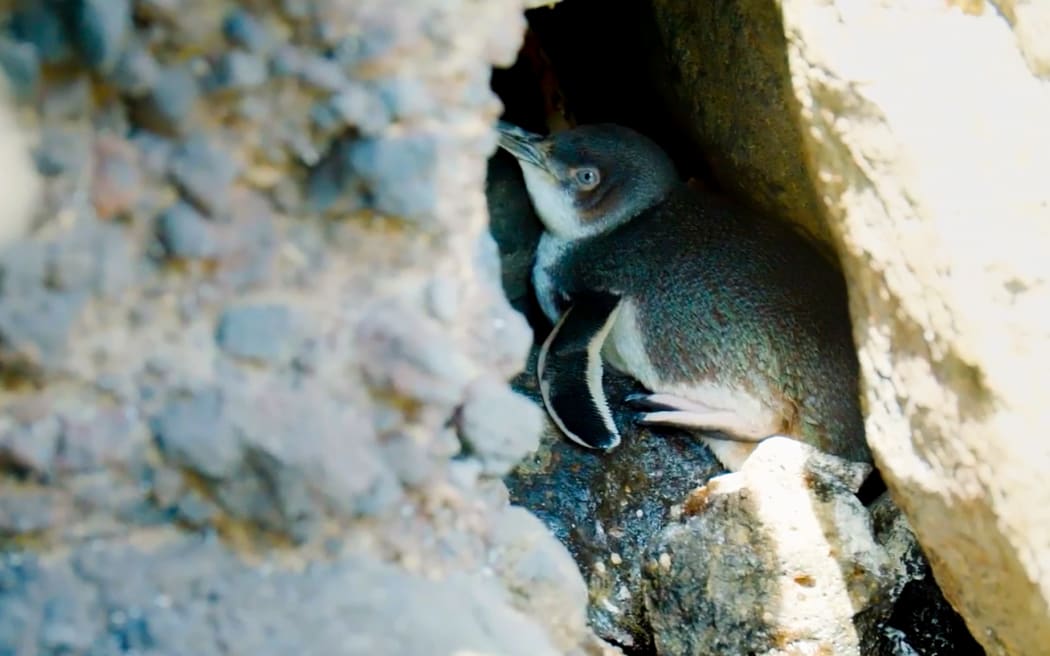
Penguin kororā Photo: RNZ
There is growing concern for the fate of little penguins / kororā on Waiheke Island with several found dead and others severely malnourished this moulting season.
From January to March, adult kororā penguins shed their waterproof feathers to grow new ones.
But a lack of food in the Hauraki Gulf means many birds are not making it, renewing calls for urgent action.
Waiheke Bird Rescue chief executive Karen Saunders said they have had several birds reported to them in just one week.
"Two of them, sadly, were dead and they were emaciated, and then we had two that we were called out to to look at, both of those had gone through their moult and they had brand new feathers, but they didn't have enough weight on to go back out to sea."
January through March is moulting season and the birds lose all their feathers, growing up to 10,000 new ones.
This means they can not swim and need to hunker down on land for weeks.
To survive they must gain 50 percent of their body weight.
But Saunders said that has been tough this season.
"Going into the moult, they should be sort of around 1.4kg to 1.5kg, they've gone in way under that, probably more at 1.2kg."
Then post moulting - the penguins should weigh about 800g, but Saunders had found some kororā well under 500g.
Saunders said it was extremely confronting.
"It's heartbreaking, I've been a conservationist for many years and I have to say it feels sort of a little bit scary this year as to what will happen, the state of the [Hauraki] Gulf now is dire."
Auckland Museum senior researcher Matt Rayner works with seabirds in the gulf and said if there was not enough food they would not have enough body fat to breed.
"We've pretty much had a failure of the whole breeding season in the inner gulf of birds on Waiheke, Tiritiri Matangi; it's been a complete disaster really."
Rayner said on top of overfishing, climate variations like El Niño were having a huge impact on the kororā's diet this summer.
"Cold water means more oxygen, it means more phytoplankton and that suits the penguin prey, but of course right now we're seeing El Niño, we're seeing yet another heat blob in the gulf and off the east coast of the North Island, warm water is not productive water."
'It's about protection'
Exotic caulerpa seaweed, which can spread rapidly, is also growing in the gulf due to warmer temperatures, upsetting the balance of the ecosystem.
If food continues to decline in the area Rayner said the number of seabirds would too and the native species could face extinction.
"They can only handle so much and if you continue to have a lack of breeding, you're going to get an ageing population and eventually, it's possible we could lose these precious little taonga from the gulf at some stage, we need real urgent action on this."
Hauraki Gulf Forum co-chair Nicola Mac Donald echoed his call.
"The time for talking is over; it's about action, what do we need to get in there very quickly and look at what do we need to do to protect our sea birds."
In August, the Labour Government launched its plan to revitalise the Hauraki Gulf introducing the Tīkapa Moana Marine Protection Bill which established 19 protected areas, regulating fishing and dumping.
The protections include bans on bottom-trawling and dragnet fishing in five areas while marine protected areas will triple, from 6 percent to 18 percent of the gulf.
Macdonald said it was a step in the right direction but would like to see an outright ban on trawler fishing and 30 percent of the gulf protected.
"I think the days have gone of great huge game fishing and the days have gone where we continue to extract; it's about protection."
They are also hoping the legislation will be fast-tracked to start protecting species like the kororā.

